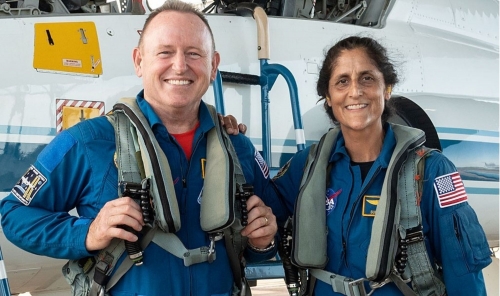Here's How Much Sunita Williams May Get Paid for 9-Month Overtime in Space
TDT | Manama
Email : editor@newsofbahrain.com
Sunita Williams, who was supposed to return to Earth after a week-long journey aboard Boeing’s first astronaut flight to the International Space Station (ISS) last year, has hit the 9-month mark this month.
NASA astronauts Sunita Williams and Butch Wilmore, who have been stationed at the ISS since June 2024, have finally received their long-awaited return date after an extended stay due to an issue with the Boeing Starliner spacecraft. This delay in their return was caused by propulsion failures that rendered the spacecraft unfit to bring them back.
On March 16, 2025, a SpaceX Crew Dragon capsule arrived at the ISS to ferry Williams, Wilmore, and two other astronauts back home. Despite being scheduled to stay for just a week, Williams and Wilmore have spent nearly three times that duration in space, raising the question: Do astronauts like Sunita Williams get paid overtime for their extended stay in space?
Do Astronauts Get Overtime Pay?
While astronauts typically do not receive overtime pay, they are entitled to a regular salary. According to former NASA astronaut Cady Coleman, astronauts receive their standard pay, and there is no additional compensation for extended missions unless stipulated otherwise. NASA provides transportation, lodging, and food, along with a small daily allowance for incidentals, which is legally mandated.
Coleman shared her own experience, noting that for her 159-day mission in 2010-11, she received a small daily allowance of $4 per day, totaling around $636 (roughly 240 BHD) for additional expenses. Using the same calculation, Sunita Williams and Butch Wilmore, who have been in space for over 287 days, will likely receive an additional $1,148 (approximately 435 BHD) each for incidentals.
How Much Does Sunita Williams Earn?
Sunita Williams and Butch Wilmore are classified under the GS-15 grade, the highest rank in the General Schedule (GS) pay system for U.S. federal employees. GS-15 employees earn a base salary ranging from $125,133 to $162,672 annually (approximately 47,800 BHD to 62,200 BHD), depending on their General Schedule Step.
For their extended 9-month stay aboard the ISS, Williams and Wilmore's prorated salaries would fall between $93,850 and $122,004 (approximately 35,800 BHD to 46,500 BHD). Adding the incidental pay of $1,148 (around 435 BHD), their total earnings for the mission are expected to range from $94,998 to $123,152 (approximately 36,200 BHD to 47,000 BHD).
This calculation does not account for potential increases in the daily incidental allowance that NASA may have introduced since 2011. While Coleman received $4 per day during her mission, the allowance could have been adjusted for inflation or other reasons, meaning that Williams and Wilmore’s additional pay could be higher than anticipated.
Related Posts

